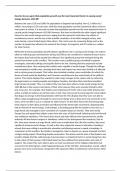How far do you agree that population growth was the most important factor in causing social
change between 1625-88?
Between the years 1520 and 1688, the population of England had doubled, from 2.5 million to 5
million, increasing by 0.5% each year; with this rising population and the inadvertent effect it had on
many parts of society, it is accurate to state that population growth was the most important factor in
causing social change between 1625-88. However, this does not diminish the other largely significant
factors for why social change occurred, ranging from the spread of racial ideas, the effects of
revolutionary events, and the rise of the scientific revolution, all of which changed society, with
some having a more limited impact than others. This can be seen by measuring things such as the
number of people they affected, the extent of the change, its longevity, and if it acted as a catalyst
for other factors.
Whilst the immense population growth played a significant role in causing social change, the actions
taken by radical groups and dissenters during 1625-88 can be considered an important factor due to
the impact they had and the people they affected. One significant group that emerged during this
period were known as the Levellers. The Levellers were a political group committed to popular
sovereignty, extended suffrage and equality before the law, showing that they expressed socially
revolutionary ideas, thus meaning the Levellers were capable of social change. Though this suffrage
only extended to wealthy men, meaning their ideas and impact may have been limited as it affected
only a certain group of people. Their other aims included creating a new constitution (in which the
House of Lords would be abolished, and Commons would become the central body of the political
system. This clearly displays they wanted to make major changes to the system and, by reforming
the legal system or creating equality and religious freedom, had ideas that could have benefited
larger groups of people. Thus, it is evident they may have been able to create social change during
1625-88 due to the essence and nature of their aims however they were severely limited by their
lack of success. For example, their leaders were imprisoned in 1649, only 4 years after they became
active, and did not achieve any of their aims; in fact, they only served to encourage the conservatism
that began to emerge in the Rump between 1649 and 53. This displays that they were not able to
affect a large enough group of people to cause social change and, as they were only around for a few
years, were not able to act as a catalyst for other factors. On the other hand, they had strong long-
term impacts as their ideas promoted and influenced later democratic movements, displaying they
had an element of social change. Contrastingly, a dissenting group like the Quakers were seen as a
large threat and managed to have somewhat of a notable impact on women. They were led by
George Fox and argued that religion comes from the voice of God himself, believing only lord himself
was entitled to obedience. This means that church and state officials who represented the earthly
authority did not deserve respect or obedience, which in turn disrespected the monarchy. Due to
this, they were viewed as a large threat, which was an implication that, like the Levellers, they were
capable of immense social change. As well as this, they supported women’s education, founding 4
schools that were willing to provide girls education and allowing women to speak at meetings. In
comparison to the Levellers, the Quakers managed to make an impact on a group of people and had
a longer-lasting impact, flourishing despite persecution. The actions and the aims of the Quakers and
Levellers display that the radical groups may have been an important factor in social change but, due
to the nature of their groups, had limited impact as they suffered from persecution and a lack of
support. The reason they were able to grow so much was because of the religious toleration that
occurred in the interregnum, which happened because of the Civil War, showing that, overall, radical
groups were not a crucial factor compared to the expansive effect revolutionary events had on other
factors.




